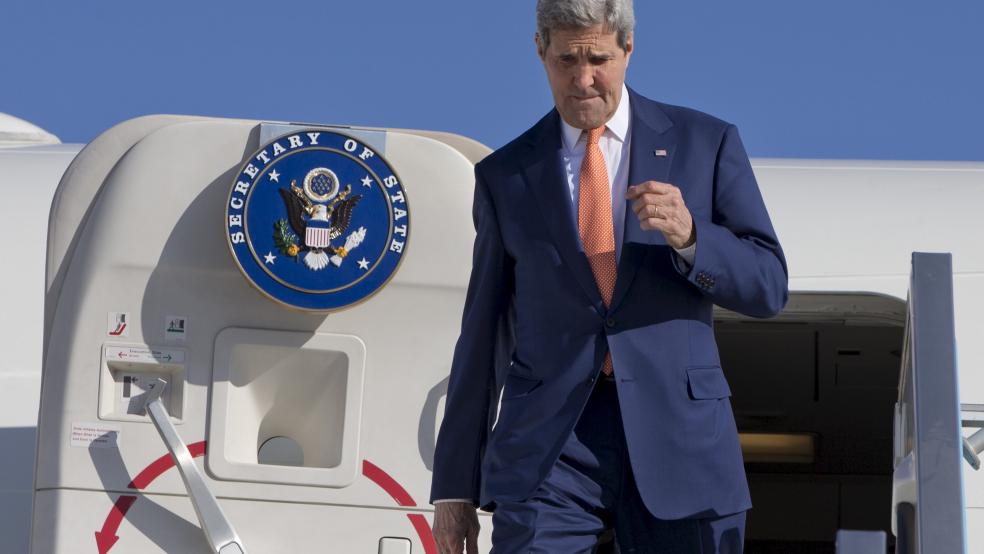The U.N. Security Council finally passed a resolution Friday authorizing a plan to end the war that has torn Syria to shreds. Does this open a new, decisive chapter in the four-year crisis? Or will it turn out to be another useless footnote to the gory story that never ends?
For the moment I take the latter view, albeit reluctantly. Amid all the grand speechifying that followed the vote in New York, the last word went to Sergei Lavrov. “I’m not too optimistic about what has been achieved today,” the Russian foreign minister said as he stood beside Secretary of State Kerry to face the microphones.
Related: Big Powers Struggle to Agree U.N. Resolution Ahead of Syria Talks
Who isn’t pleased that the five-member council, heretofore riven as to the primary objective in Syria, has finally agreed that the nation’s No. 1 problem is the Islamic State, not the Assad government in Damascus? Who doesn’t want globally inclusive alliances—two of them now—that are supposed to dedicate themselves to destroying ISIS and the infrastructure that supports it?
“Not everybody” is probably the regrettable answer to both questions.
There’s a lot of blur and ambiguity to sort through as to what’s what among the dozens of nations claiming a role in resolving the Syria crisis, and when you scrape it away, what’s left seems to be a little commitment well-diluted with a lot of unserious talk and empty gesture.
Let’s look at this one coalition at a time to find the faults in what looks awfully like a façade.
First is the alliance of the major Western powers and regional powers such as Saudi Arabia and Turkey. As of Friday’s resolution this coalition supposedly includes Russia and Iran. The question is, does it?
It is well camouflaged in the press reports, but in talks last week with Lavrov and President Putin, Kerry essentially capitulated to the Russian position on the Syria question. The U.N. resolution calls for a ceasefire, a constitutional revision, and internationally supervised elections that leave the post-crisis Syrian government up to Syrians. These are exactly the terms Lavrov proposed at the first round of “Vienna process” talks in the Austrian capital in October.
Related: Germany says obstacles remain for Syria after U.N. backs peace process
In effect, the U.S. has just taken “regime change” off the table as a precondition of any settlement. This is smart. Kerry now stands properly in favor of Syrian self-determination, a position that many have urged the administration to take, including Donald Trump.
“The United States and its partners are not seeking so-called regime change,” Kerry declared after his meeting with Putin and Lavrov in Moscow last Tuesday. It’s good to hear this stated so clearly, but the Obama administration’s position on Assad remains a hopeless blur.
Obama still backs anti-Assad jihadists as if some radical Islamists are “moderate”—a notion long ago revealed as nothing more than pretense. Turkey, which is obsessed with toppling Assad, remains an ally; Saudi Arabia, Washington’s other key partner in the region, is the very wellspring of the Islamic State’s radical ideology.
We now have the clearest view yet of the deep divisions that plague the Obama administration’s foreign policy team. On any given day in Washington, Obama’s people might acknowledge that Assad is no longer the main event in Syria or insist that Assad must go, and there’s no change in policy. Not even Kerry is consistent.
Related: Saudi Arabia Says Sending Special Forces to Syria Under Discussion
This kind of amateurism on a question as consequential as Syria simply won’t do. The sine qua non to solving the Syria crisis as a stand-alone issue is a tactical alliance between the U.S. and Russia.
Kerry seems to grasp this—finally. But who knows whether even the president has his back? In my view, this is why Lavrov effectively said last Friday that he isn’t putting any chips down on the U.N. resolution just yet.
As Kerry met Putin and Lavrov at the Kremlin, the Saudis simultaneously announced that they had formed a 34-nation alliance of Muslim nations to fight terrorism. This new coalition is supposed to train and equip ground forces, which everyone who opposes ISIS knows are essential to success.
This proposition reeks. Who can say what the Saudis mean when they say they’re going to fight “terrorism” wherever it may arise?
Related: Russia Open to Assad's Ouster After Syria Transition: Diplomats
Some nations the Saudis listed among its ranks immediately said they’d heard nothing about it. Even if we take the membership count at face value, it’s 100 percent Sunni, which raises the inevitable question of exactly what this group proposes to defeat and what advance.
The list of opposition groups invited to negotiate Syria's future excludes only the Islamic State and al-Nusra, one of al- Qaeda’s local stand-ins. This may please Riyadh, which is far from allergic to terrorist activity so long as it’s Sunni-led and someplace else, but it is otherwise too inclusive by a long way.
This coalition is nothing more than cynical flim-flam intended to advance the new Saudi leadership’s ambition to project itself as a regional power. Given Saudi Arabia’s Wahhabism ideology and its profound opposition to democratic political institutions, the sooner this is recognized as fraud the better.
The take-homes: One, there’s a path open to an alliance between Washington and Moscow, but it’s narrow and for the moment the Russians and (some of the time) Secretary Kerry are the only ones on it. Two, coalitions may be the flavor of the month, but the one the Saudi’s just formed—or say they formed—is not to be welcomed.






